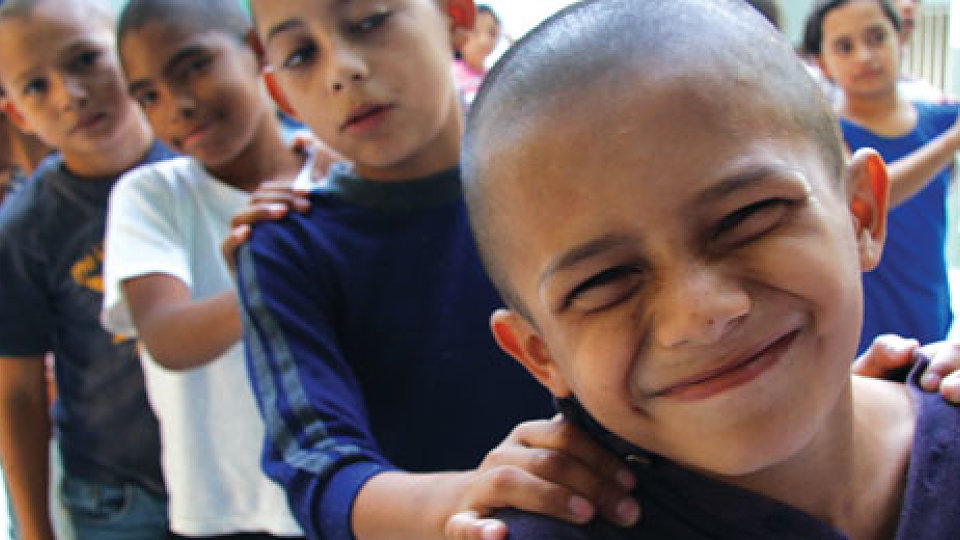Honduras Needs Us Now
By Russell Dilday, Editor, Buckner Today
Not again, I thought as I passed through the single steel door of Nueva Esperanza’s 20-foot concrete wall. Not like Romania.
Dozens of children, mainly small boys, greeted us as we entered the compound. Waifishly thin, most had shaved heads, a prevention against parasites. They wore shorts and shirts, but none wore shoes. Many had extensive scarring on their heads and bodies, a product, we were told, of gang violence while they were on the streets.
Our small exploratory team had already visited two private orphanages on the northern coast of Honduras. Both had the same feel: small and needy, but well-ordered. The children sang songs and dressed in uniforms. The only uniform within the single mint green building that is Nueva Esperanza (New Hope) Orphanage is, ironically, despair and poverty.
It took me back to my first trip to Romania in 2000, before the government orphanage reforms that provided foster group homes. Back to the time of the big orphanages, the dirty children, the poor nutrition, the small, overworked staffs, the hopeless looks.
Not again.
I thought I’d seen the last of that type of orphanage. I’d gotten used to seeing orphanages where we’d been working, where Buckner has made a difference through physical improvements and sharing Christ with children in several countries. Where the kids know and look forward to us coming. Here, on the outskirts of San Pedro Sula, it looks like I haven’t.
“The key word here is desperate,” says Leslie Chace, director of Buckner International’s global initiatives in Central and South America. “The government has very few resources to care for the 5,000-plus children under their care, not to mention the countless private orphanages around the country.
“At every orphanage we’ve visited, we found the children extremely hungry for love, with minimal supervision, little resources, poor conditions and the special needs children left to fend for themselves,” she explains. “Although we find caregivers with enthusiasm and dreams to help the children, they are overwhelmed by the lack of resources and needs of each child.”
You could read the hopelessness in the children’s eyes. In the first two orphanages, children greeted us with smiles and hugs. Here, the kids stood and looked at us as if not knowing how to interact with an adult. Maybe they don’t. Or maybe they do, but the adults in their lives have taken advantage of them all their lives and to let an adult into their lives has meant more suffering.
Fortunately, we had David Balyeat on our team, a missionary kid from Argentina and missions minister for Shiloh Terrace Baptist Church in Dallas, he soon had the children surrounding him, eager to hear what he had to say. The kids began to warm to him and, consequently, to the rest of us.
Team member Tod Bush, from Athens, Texas was swarmed as he sat against a wall. They just wanted to be held. Christian recording artist Geoff Moore also is part of the team and sings for the children, who seem to love music. A father of four – two adopted from China – Geoff’s a natural with the kids. He gets mobbed, too.
We toured the home and spoke to staff. While there are 10 staff at Nueva Esperanza, they work in shifts so that only five are on campus at any one time. Five for 92 children, some of them infants in need of constant care. Some of them special needs children. All of them in need of love.
I sat at a desk as I talked to Nueva Esperanza’s director in a classroom. She’s young and passionate about helping the 92 children in her care.
“We want the best for our children,” she begins, but is interrupted by one of the boys, who curls up on her lap. She strokes his shaved head like a mother.
“The children are brought in by the courts and the police for sexual abuse, for extreme poverty and for parents being irresponsible,” she continues, adding the job is often difficult. “But God has shown me to never let my guard down, to watch over my orphans.”
She knows the stories of all the children, even the stories she doesn’t want to know. Describing some of the situations, she painfully tells of an infant who came just prior to Christmas, malnourished and sick. Despite efforts at the orphanage and a local hospital, the baby died just a few days after arrival.
She tells about an 11-year-old girl listening to David in the home’s courtyard. Sexually abused by her stepfather, she was offered to another man by her mother if the man would build the family a house. The police uncovered the scheme, jailed the homebuilder and sent the girl here, where she’s lived eight months.
As we finish talking, the director notes the desperate needs for Nueva Esperanza: facility maintenance, clothing, shoes, recreation equipment, more workers, help transitioning the children to higher education. I promise to tell her story, even though the weight of the needs here feel so heavy. Her list seemed too big from the start, but Leslie says Buckner already has 5,000 shoes on the ground, ready for delivery to Nueva Esperanza’s shoeless children. It will be the first step toward a little hope at New Hope.
And the despair that hung around the group as we first entered lifted… a little…. as we got to know the children and saw their smiles. There is hope here, if we will bring it.




Comments